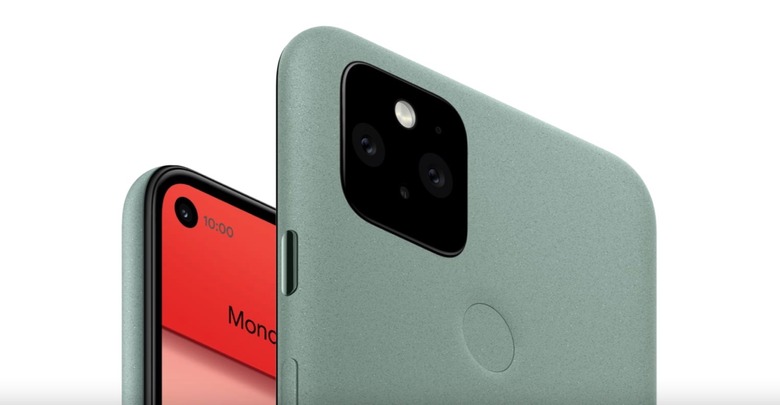Google's Latest Announcement Could Be Huge News For The Pixel
About a year ago, there were already plenty of Pixel 5 rumors floating around. We had heard that the phone would feature a mid-range processor rather than the best chip available. It turned out to be true, and the Pixel 5 was no match for the iPhone 11, let alone the iPhone 12. But just as the bad news was piling up, another report gave Pixel fans reasons to hope that Google might not make the same mistake with its next Pixel.
Google's announcement on Monday is one more reason to anticipate a brand new kind of Pixel, but it's still too soon to say whether it's going to be the Pixel 6, or if we'll have to wait another year for the next evolution.
A report from Axios in April 2020 claimed that Google was working with Samsung on a processor of its own codenamed Whitechapel. Samsung's "state-of-the-art 5-nanometer technology would be used to manufacture the chips," the report said, adding that the new silicon might power future versions of Pixel smartphones as soon as 2021. That would be the Pixel 6 series that Google is expected to unveil this fall.
Google on Monday announced on the Google Cloud blog that chip veteran Uri Frank would be Google's new Vice President of Engineering for server chip design. The announcement is clearly focusing on the server-side of things, where much of the Google magic happens:
To put our future vision for computing in context, let's briefly take a look back at history. In 2015, we introduced the Tensor Processing Unit (TPU) to customers. Without TPUs, offering many of our services such as real-time voice search, photo object recognition, and interactive language translation simply would not be possible. In 2018, we launched Video Processing Units (VPUs) to enable video distribution to a range of formats and client requirements, supporting the rapid demand for real-time video communication scalably and effectively. In 2019, we unveiled OpenTitan, the first open-source silicon root-of-trust project. We've also developed custom hardware solutions from SSDs, to hard drives, network switches, and network interface cards—often in deep collaboration with external partners.
But in addition to announcing Uri's involvement in server chip design, Google also took this opportunity to highlight the future of Google computing: The "Systems on Chip" (SoC) designs that will replace the motherboard:
Instead of integrating components on a motherboard where they are separated by inches of wires, we are turning to "Systems on Chip" (SoC) designs where multiple functions sit on the same chip, or on multiple chips inside one package. In other words, the SoC is the new motherboard.
On an SoC, the latency and bandwidth between different components can be orders of magnitude better, with greatly reduced power and cost compared to composing individual ASICs on a motherboard. Just like on a motherboard, individual functional units (such as CPUs, TPUs, video transcoding, encryption, compression, remote communication, secure data summarization, and more) come from different sources. We buy where it makes sense, build it ourselves where we have to, and aim to build ecosystems that benefit the entire industry.
The processor that powers a smartphone is an SoC. The Snapdragon 888 in the Galaxy S21 or the A14 Bionic in the iPhone 12 are SoCs. We usually refer to them as processors, as it's a simpler way to describe these components, but they contain other key chips in addition to the processor.
Google's interest in creating new chips for servers does not provide direct evidence that the Pixel will get a custom Google chip or that the Pixel 6 will be the first Google phone powered by a Google chip. But Google's interest in SoC designs for the future of its computing needs stands out. And if you are making your own chip hardware based around SoCs, then consumer devices like the Pixel phones have to come to mind.
The massive success of the A-series chips helped Apple build up to the M-series processors that now power MacBooks. Google might want to copy that strategy. Google will continue to need to make Pixel phones for years to come, at least until Android is replaced with a different operating system.
